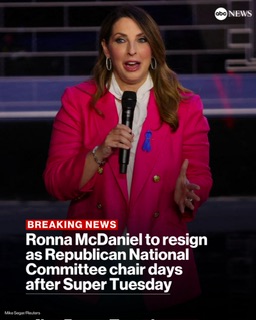
After seven years as a GOP topper, Ronna McDaniel will be expelled from her post as chair of the Republican National Committee.
According to her prepared statement, she will step down on Friday, March 8, which is International Women’s Day and following Super Tuesday.
The folks who recruited me, as an NPA even though I have no political affiliation. Reagan-Bush 1980/1993: The Reagan presidency, lasting from 1980 to 1993, the Bush until 1993 constituted what is known as "the Reagan Revolution" It was seen as a fundamental shift from the stagflation of the 1970s preceding it, with the introduction of Reagan's economic policies intended to cut taxes, prioritize government deregulation, and shift funding from the domestic sphere into the military to check the Soviet Union by utilizing deterrence theory. During a visit to then-West Berlin in June 1987, he addressed Soviet leader Mikhail Gorbachev during a speech at the Berlin Wall, demanding that he "Tear down this wall!". The remark was later seen as influential in the fall of the wall in November 1989 and was retroactively seen as a soaring achievement over the years. The Soviet Union was dissolved in 1991. Following Reagan's presidency, Republican presidential candidates frequently claimed to share Reagan's views and aimed to portray themselves and their policies as heirs to his legacy.[
Radical Republicans have always been around, but we have not been able to overcome them until now. A long time ago during Lincoln's presidency, they felt he was too moderate in his efforts to eradicate slavery and opposed his ten percent plan. Radical Republicans passed the Wade–Davis Bill in 1864, which sought to enforce the taking of the Ironclad Oath for all former Confederates. Lincoln vetoed the bill, believing it would jeopardize the peaceful reintegration of the ex-Confederate states
According to Wikipedia - In 1854, the Republican Party was founded in the Northern United States by forces opposed to the expansion of slavery, ex-Whigs, and ex-Free Soilers. The Republican Party quickly became the principal opposition to the dominant Democratic Party and the briefly popular Know Nothing Party. The party grew out of opposition to the Kansas–Nebraska Act, which repealed the Missouri Compromise and opened the Kansas and Nebraska Territories to slavery and future admission as slave states. They denounced the expansion of slavery as a great evil but did not call for ending it in the Southern states. While opposition to the expansion of slavery was the most consequential founding principle of the party, like the Whig Party it replaced, Republicans also called for economic and social modernization.[citation needed]
At the first public meeting of the anti-Nebraska movement on March 20, 1854, at the Little White Schoolhouse in Ripon, Wisconsin, the name "Republican" was proposed as the name of the party. The name was partly chosen to pay homage to Thomas Jefferson's Democratic-Republican Party. The first official party convention was held on July 6, 1854, in Jackson, Michigan. - And so it goes…